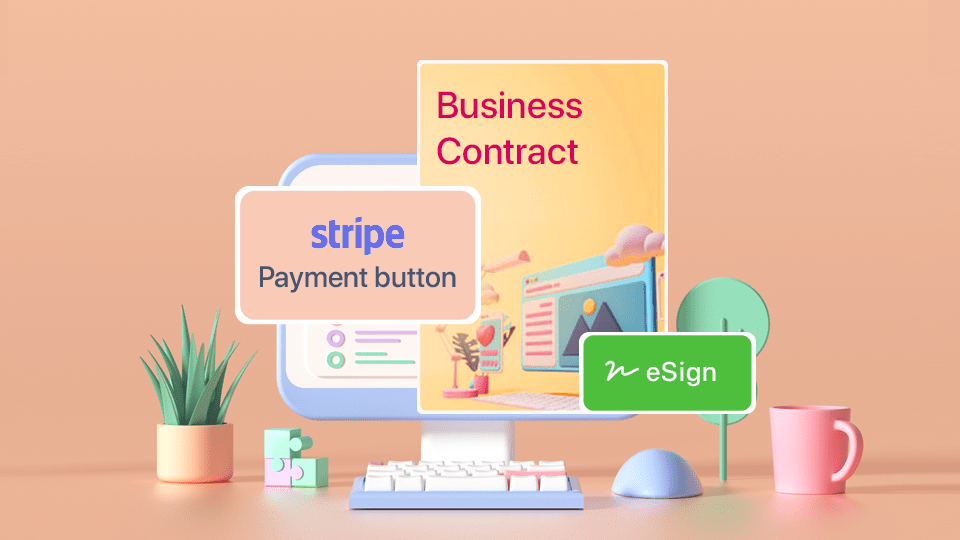Businesses require contracts and agreements to document every kind of transactional exchange that happens between stakeholders. While a handshake remains an important sign for closing deals among stakeholders, in legalese, a written contract or a written agreement ensures that either of the parties can take the other to court for dispute resolution. But contracts have become extremely detailed nowadays. To ensure that the written contract has all possibilities and eventualities clear, it is often necessary to know ‘how to write a contract.’
A lot of businesses often use contracts and agreements interchangeably. But both of these documents hold different meanings.
According to the Black Law Dictionary, an agreement is a ‘mutual understanding between parties and their relative rights and responsibilities.’ A contract is an ‘agreement between parties creating obligations that are enforceable.’
Before knowing how to write a contract, a valid contract itself needs to be clear and specific. If one party finds the other party in breach of contract, the party being harmed can issue a lawsuit against the party it believes has breached the contract. The legal process is also called litigation, and it finds out if either party is in breach of contract or are there any circumstances that negate the breach.
This is why a valid contract often forms the basis of all business relationships. Before we deep-dive more into these legal documents, let’s understand what is a business contract.
What is a contract?

In the simplest of terms, a business contract is a promise that establishes business relationships. In legalese, a breach of contract means a violation of the agreement’s terms and conditions. This breach can be anything, from the failure of payment to late payment to more serious issues like failure to deliver a promised asset.
The business contract is a written document of expectations of all interactions that happened between the two parties in a fixed period of time. It also ensures that the parties agree to the terms of their relationship.
A business contract typically includes three parts: the offers, counteroffers and the exchanges. The first, talk about the offer and the other accepting it. A detailed written contract will also have the name of the parties, state’s laws, confidential information and other details. The exchange part is usually the transactional bit and includes money, goods, and services.
A business contract is exchanged to protect your business. Be it a small business or a big enterprise, these business contracts help set boundaries and provide solutions to any potential problems. It also helps clarify legal liability.
What makes a contract legal?
For a contract to be legally binding, it needs to contain the following two elements:
- All parties must be in agreement especially after an offer has been made to one party
- Something of value has been exchanged between the two parties, like cash, services or goods
Difference between paper and online contracts
Most companies are switching over to online contracts from traditional contracts for reasons like ease of use, elimination of errors and more. Here are some of the basic differences between online and paper contracts.
| Online contracts | Traditional or paper contracts |
| There are readily available legally vetted templates available that users can customize according to their business requirements. This significantly reduces the dependency on legal teams. It also eliminates the chances of manual labor. | Traditional or paper contracts still require manual drafting and a legal team to vet the draft. |
| Esignature becomes easy when it comes to online contracts. | A wet signature requires much more time and effort of both parties, lengthening the already long process. |
| In most online contracts, you can directly integrate a payment link. | Payments are usually done separately which means maintaining separate records and more paper. |
| Online contracts are more secure than traditional contracts. | Traditional contracts can easily be copied making them susceptible to forgery. |

Want to take the hard work out of drafting contracts? Try Revv’s contract templates
Types of contracts – Unilateral and Bilateral
All business contracts can be broadly segregated into two primary categories – bilateral contracts and unilateral contracts. While both have terms and conditions that can result in litigation, a bilateral contract is a legally binding agreement (in writing, typically) with terms and conditions negotiated between two parties. A unilateral contract is written by one part, which determines the terms and conditions but is the only part with any obligations under those terms. If any of these valid contracts are breached, the party that has sued must prove that they suffered a loss because of the breach.
Most business contracts are bilateral. These include (but are not limited to) employment contracts, professional service, and sales agreements, leases, mortgages, warranties, etc.
Here are some of the other types of contracts –
- Executory contracts – In these contracts, the two parties must perform specific tasks by a specific date. These types of contracts exist between the borrower and a debtor. A real estate lease agreement is a perfect example where the tenants agree to pay rent by a certain date and, in exchange, get to stay at the property.
- Implied contract – For an implied contract to be enforceable, a meeting of the minds is necessary. For example, you agreed to wash the car of your friend in exchange for some money. You didn’t put this in writing because you trust your friend. This kind of contract is enforceable if a meeting of the minds can be proved. It remains a good practice to get a written contract and have it signed.
- Voidable contract – These are contracts that can be unenforceable for any number of reasons, like when the seller does not disclose an important factor when the contract is signed under duress. For example, if you have entered into an agreement to buy a house, and the seller does not inform you about the pest infestation, then you’ve entered into a voidable contract.
- Void contract or an Unenforceable contract – These are unenforceable contracts from the moment parties agreed to perform. It can never be legally valid. This is slightly different from a voidable contract because the seller (like in the previous example) can still hire services to eliminate the pest infestation.
- Contingency contract – This is usually signed between two parties when they cannot reach an agreement. The terms of the contract aren’t final and can be based on the events yet to occur. For example, a company may sign up with a consultant only once the consultant has delivered all the tasks as agreed during the stipulated time period.
Besides these major types of contracts, business contracts are also divided based on their users, like the yellow dog contracts and the quasi-contracts. These are as follows:
- Contract for deed or Land contract – It is pretty similar to that of mortgage but here, the seller finances the deal instead of a bank. The deed ownership is transferred to the buyer only once all the payments are cleared. This is often used when the buyer cannot get traditional financing help.
- Contract of adhesion – This is a contract drafted by a party with a stronger financing power. These are also known as standard contracts or boilerplate contracts because the party with less bargaining power cannot negotiate or modify the terms. Some famous examples of such kinds of contracts are auto purchases, insurance contracts, leases, etc.
- Yellow dog contracts – If any organization requires an employee to sign a contract that promises that the employee cannot work for a competitor, it is called a yellow-dog contract. While this kind of contract was widely popular in the 1930s and prevented employees from joining Unions, these contracts often come in as non-compete agreements today.
- Unconscionable contract – These contracts are entirely unfair for one party and does not leave the said party with any good choices. These are unenforceable, and if the court finds that the contract is unconscionable, they usually declare it void and release the parties from any obligation.
- Quasi-contract – This is also called the implied contract. This prevents one party from enriching themselves by exploiting the disadvantaged party. These are often used by companies in home services like landscaping contracts wherein the contractor might ask for extra payment when covering another service. The contractor can take the other party to court if they do not recover the costs to complete the job.
- Option contract – This is an agreement between a buyer and a seller that lets the seller sell a particular asset later at a price that they both agree to.
- Aleatory contract – This needs to happen before the obligations of the contract are carried out. One of the best examples of such contracts are insurance policies, you pay a premium in exchange for the insurance the company will be providing for, like a car accident, etc.
- Futures contract or forward contract – This is an agreement that is used in futures or commodities trading. Under this agreement, someone agrees to buy or sell the commodity or the asset at a specified time and a specified price.
- Cost plus contract – In this contract, one party agrees to reimburse a second party for expenses plus a specific amount of the profit. Cost plus contracts enable the buyer to assume some risk of the success of the contractors’ products.
When you are drafting a contract, it is important to know which kind of contract applies to which kind of situation and avoid which contracts benefit both parties.
The four main elements to include in your contract

When you are drafting a valid business contract or evaluating one you need to sign and close, the contract should ideally include four main elements. These are:
Offer – Any valid contract starts with an offer. The offer is an expression of willingness to enter the contract on certain terms and conditions. This sets the precedence over what is and what is not an offer. These are usually firm, not ambiguous or vague.
The offer can be of two things, one being items that are being sold in a sales contract, such as real estate, automobiles, boats, and electronics, or any other tangible items. The seller mentioned in the contract is the property owner, and the buyer/purchaser is the party who is receiving the goods.
The other offer is of non-tangible items like services. This comes under service contracts, and can range from pest control services, landscaping services, home security, and equipment maintenance. To cite an instance, the employment agreement contract is a type of service contract where the employer and the employee sign a valid contract for specific services that the employee will deliver.
| An offer is not an Invitation to treat: Both of these are different. When you place an invitation to treat, the receiving party may or may not accept it. For instance, if you place an online ad to sell your car for a certain price. A customer may offer you the full price for the vehicle, but you may choose not to accept it. And, for the offer to be enforceable, the offer should always specify the goods and services. If the contract fails to do so, it can be considered void if either party chooses to dispute the contract later. |
The Acceptance –Any acceptance from the person accepting the offer is an unconditional agreement to all the terms mentioned in the contract. It is the result of the meeting of minds of mutual assent. This also translates that the parties involved understand what is being offered in the contract.
| The ‘mirror image’ of the offer: Silence is not equivalent to acceptance. It is important, therefore, that the acceptance must be communicated to the person making the offer. This is why Revv comes with a ‘Send for Acceptance’ feature that allows users to share documents for a soft-sign before final deal closure. |
Consideration – Both the parties involved must exchange consideration as an element of the offer and acceptance. This consideration can be in the form of cash for the purchase of products or services, a wage of an employee, or even something of value. The key here is that the parties are exchanging something of value as a requirement of the offer and the acceptance.
| Consideration is different from gift-giving: A consideration is what differentiates a contract from a gift. A gift is voluntary and gratuitous transfer of property from one person to another. This is promised without any expectation of any return of any value. Failure to do so, does not make the contract enforceable as a breach of contract because there is no consideration. |
Legality – The fourth element required in a valid contract is legality. The courts do not enforce an illegal contract in case there is a breach. This is only possible when both parties agree to bind themselves to the agreement legally.
| The contract has to be in writing Under the common law doctrine of the ‘Statute of Frauds,’ which has been codified in the General Obligations Law (GOB), all contracts have to be in writing. What is important to understand is that just about any form of writing is acceptable in the court, from a handwritten note to even an email, only if all the elements of the contract are met. |
E-signatures – For any valid contract, it is also the best practice that everyone signs the agreement. While this might not be necessary legally, it does help prove that each stakeholder agreed to the contract’s specified terms.
| Electronic signature vs. Physical signatures: While both are legally acceptable, and physical signatures are more traditional, it is deemed impractical, especially now. Using apps like Revv enables everyone to add signatures with one click. Revv eliminates the need for a physical signature. You can add a signature with a single click, along with additional information. This eliminates the process of printing, scanning, or even emailing contracts for signage. It accelerates the process. Use Revv’s contract templates to draft, send and share contracts and even track user activity on the document itself. |

Want to take the hard work out of electronic signature? Try Revv’s eSign feature now
Guide on how to write the perfect contract

Drafting the perfect contract can be one of the biggest challenges in your working relationship with your customer. But here are a few ways to go about the process –
Getting it in writing
Oral agreements are legal and binding in many situations but can be difficult to enforce if there is a breach of contract. In the business world, the best practice demands that agreements be in the written format because each party is clear on their rights and obligations.
Using simple language to convey the terms of the contract
Many lawyers add many heretofore and parties of the first part legalese thinking what will make the contract enforceable. Instead, even if you use short, crisp sentences with simply numbered paragraph headings, the contract still is enforceable in case of legal action.
Being as detailed as possible
Using simple language can often be construed as avoiding spelling out of certain rights and obligations. But that is not the case. It is a good idea to be detailed. If you forget to include something, there is always a chance to create a short written amendment. If you haven’t signed the agreement, you can also edit the change, for instance, adding a non-disclosure agreement in the employment agreement. This change, however, needs to be initialized for it to become a part of the contract.
Including payment details
It is always a good idea to specify who pays whom when the payments are required and the conditions for making the payments. Money often is a contentious issue and therefore, make it as detailed as possible in the document itself. Try to include payment links and the payment terms, like that in Revv (it integrates easily with Stripe) for some parties requiring faster checkouts.
Including the terms of termination of the contract
List out the circumstances under which the parties can terminate the contract. For example, if a party misses deadlines, the other party has the complete right to terminate the contract without any legal action being taken.
Include terms of resolving conflicts or disputes
Despite having a contract, there are times when things can go wrong between parties. This is why it is a good idea to write into the agreement of what you and your other party will do if something does go wrong. Each party can decide on the next legal action whether they want to handle the dispute through arbitration or mediation and the time frame needed.
Considering the contract laws that are applicable in the jurisdiction especially if located in different states
If both the parties are located in different parts of the country or even the world, define your contract laws based on either location or the different states. Choose only one of your state laws to avoid sticky legal issues later. The location and jurisdiction should clearly state which methods of arbitration or mediation and following legal actions will be undertaken. This simplifies issues in the long run.
Consider adding a confidentiality clause
When one business hires another service, they often are privy to sensitive information. This is why agreements should contain mutual promises that each party will keep all crucial information confidential while executing the contract.
Reaching the negotiation phase
Before any contract reaches the agreement phase, there is usually one last stage which is crucial to both parties, and it is the negotiation phase. While there are several devious methods at play at this stage, it is important to follow certain steps. For example, break down the negotiation in parts and then prioritize. This will help retain focus on what is important. Secondly, always end negotiations on a positive note as they will help set a collaborative tone. Lastly, do not use your feelings to negotiate any clause as it tends to drag the negotiation process and often bears an ugly side.
| Key takeaways: – Get contracts in writing – Avoid legal jargon and yet be as detailed as possible – Include payment details – Consider the state laws when drafting the contract – Add a confidentiality clause – Be calm and composed especially during the negotiation phase |
Ten essential contracts that small businesses need

Crucial to the success of a small business, these are some contracts that need to be drafted carefully.
- Employment agreement – One of the best ways to understand your employees and protect your business from legal liability, is to have an employee agreement in place.
- Non-disclosure agreement – A non disclosure agreement or an NDA is a legally binding contract that establishes a confidential relationship between two or more parties. This is signed when sensitive information is exchanged.
- Letters of intent – This is one of the fastest ways to get momentum for a deal. The idea behind this contract is for the parties to get a handshake deal on major points and then move on to create definitive legal agreements.
- Sales proposal – This is a document that businesses can use to pitch their services or products to prospective customers.
- Lease agreement – One of the most important contracts that any small business can sign is a business lease.
- Non-compete agreement – This contract is usually signed between an employee and an employer. The employee promises not to join competitors of any kind after the employment period is over. These agreements also prevent the employee from revealing trade secrets or proprietary information.
- Service agreement – A service agreement is signed between two businesses where one agrees to provide a specified service to the other.
- Consultant agreement – This contract is usually exchanged between businesses and individuals that are retaining certain services of the consultant.
If you are running a small business, here’s a list of documents that will help you operate seamlessly. Begin your entrepreneurial journey with the right kind of contract templates. Protect yourself from legal exposures. Customize these according to your business needs and send for e-sign with a single click.
| Struggling to understand contracts? Read our blog here for more information. |
Using Revv’s contract templates to optimize processes

- Sign in Revv and select your template from the templates library. You can choose from the hundreds of business contract templates available
- Select the template that you require. Edit the template according to your brand and business requirements
| Since contracts often require payment, link Stripe payment here. |
- Include e-signature blocks within the document with ‘Esign’ block. Or send the document for a soft sign with ‘Send for Acceptance’ feature. (Read here to know more)
Read here:
- How do I create a contract using Revv?
- How to create a new contract?
- How to select a template from the template library?
- How to add electronic signatures?
- How to send for acceptance?
- How to send for approval?
Intelligent contract processing with Revv
Revv is designed to help businesses with their paperwork. It brings the power of electronic signatures, an exhaustive template library with drag and drop editor, payments and G-sheet integration and API connections. This enables consultants, operators, freelancers and business owners to draft, send, share, sign and track business contracts faster.
Check out how Revv contract templates can help win business faster.
Understand and close your contracts faster
Having the right contract in place is one of the best ways to manage business expectations. To get started, you might need to get familiar with the contract laws applicable to your jurisdiction, what elements to include in your contract, how to manage and store your contracts for quick retrieval, and the various kinds of contracts that you can use for your business.
This blog acts as a guide on how to write contracts and accelerate your business operations. If you still find the process daunting, you can also start the process by using tools such as Revv that takes care of drafting legally vetted contracts from the start by offering templates. You can also use its other features like getting consent or a soft sign with its send for acceptance feature, integrate payment links, use Zapier to integrate messaging platforms, etc.
Sign up for a free!
For now, being able to draft the contract online and have it signed electronically will save you time and help optimize your business processes. This guide will help you get started!

Want to take the hard work out of drafting contracts? Try Revv’s contract templates


